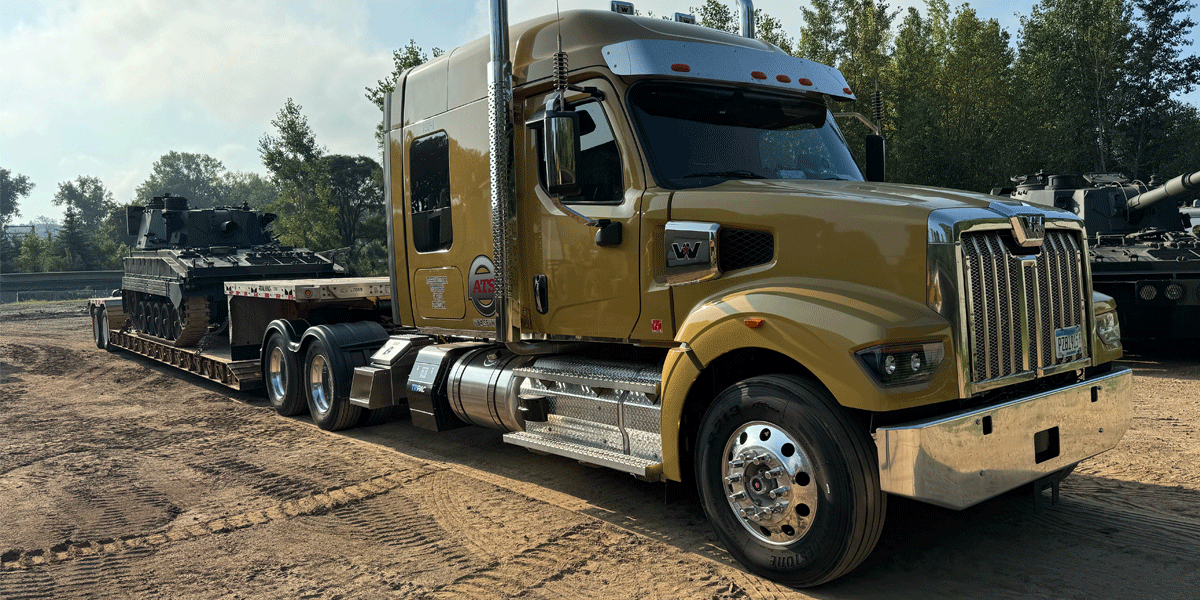Having grown up around the trucking industry — with his dad and several uncles serving as truck drivers — it’s only natural Jeron found his way into the industry as well. Jeron joined ATS in 2018 as a member of the marketing team, where he grew his knowledge of the trucking industry substantially. Now as the driver recruiting manager, he is responsible for ensuring a smooth recruiting process in order to create a quality driver experience.
Are you thinking about changing jobs? Have you found a carrier that is greener on the other side?
Before you make that switch, you have to think about your finances first.
Whomp whomp whomp.
Not to deflate your balloon or anything, but it’s really important to consider the cost of switching carriers before you jump.
Not that we’re telling you you can’t switch companies — you definitely can. It’s just good to know what to expect so you aren’t surprised by anything.
As the manager of driver recruiting here at Anderson Trucking Service (ATS), I’m here to help guide you on the right path so you can find your carrier home — even if that means you aren’t driving for ATS.
Let’s dive right in and talk about some of the costs you’ll incur when switching carriers.
Cost #1: Income
When you switch carriers, you may have some downtime between turning your truck in at your current job and starting orientation at your new carrier.
It’s best practice to put in a two-week notice at your carrier, so try to work it out so you can turn your truck in a few days before you head to orientation at your new carrier. That way, you won’t have as large a gap between jobs.
You’ll stop getting the money you’ve been earning each week at your current job and have some downtime before you get up to speed with your new carrier and how it runs. Not only that, but you may have to pay to get to orientation or pay to cover lodging and meals. Some carriers don’t cover this expense. (Just for reference, ATS covers this expense for you and your spouse.)
And if your new carrier doesn’t have a sign-on bonus or orientation pay, you’ll have some time without any pay at all.
To give you some insight, if you’re used to earning $2,000 per week, you may have to get used to earning less for a little bit as you adjust to the new position.
In fact, the National Transportation Institute (NTI) says it takes about 90 to 120 days for a driver of any kind in a new job to get up to speed. Similarly, a driver who only works a partial year at a carrier (compared to their counterparts who spend more than a year there) earns about 24 percent less. This is something to consider when you switch jobs.
Make sure you prepare for a dip in income before you switch carriers. It’s best to have some money set aside before you make the switch.
Related: How long to stay with a new carrier
Cost #2: Health Benefits
Depending on what kind of truck driver you are, you may or may not have company-sponsored benefits. For example, company drivers are treated as employees of the company, so as long as the company offers health insurance, you’ll be offered it. Independent contractors and owner-operators, on the other hand, have to source the open market for benefits.
If you’re a company driver thinking about switching carriers, make sure you consider your health benefits. Most companies don’t offer benefits until you’ve worked for them for a certain amount of time, so you’ll have a period without any health benefits. This can be an issue if something comes up.
For example, if something happens in the early stages at the new carrier, you may not have health benefits. The resulting bills will most likely have to be paid out of pocket and that can really add up.
People don’t often think about this when changing carriers. Make sure you have a plan in place by looking into gap health insurance or extending your current company-sponsored benefits with a plan like COBRA.
It can be tempting to forego insurance for a few months, but accidents happen. You don’t want to go without.
Cost #3: Sign-on and Lease Completion Bonus Payments
Do you have a sign-on bonus or lease completion bonus with your current carrier?
Bonuses typically come with a few stipulations. Normally, trucking companies require you to drive with them for a specific amount of time before you receive the full sign-on bonus. For lease completion bonuses, you may have to finish out the lease. If you leave before that time is up, you forfeit the bonus.
A lot of carriers will give you part of the sign-on bonus when you certify to drive for the carrier, but the rest will come a few months down the road. If you haven’t received your full sign-on bonus with your current carrier yet, you’ll lose the rest.
Cost #4: Your Reputation
Hopping from job to job can be tempting — after all, you want to find the carrier that’s perfect for you. However, doing so can damage your reputation and make a serious dent in your wallet.
Related: Why you shouldn’t job-hop
Many carriers, like ATS, have strict requirements. They don’t want to see more than a few carriers on your resume over the last year. For example, if you’ve been at more than three carriers in 12 months, you may not qualify for a job at some carriers.
The reason carriers have this rule in place is because they want drivers that will stay on the fleet for more than a month or two. Not only is it costly to onboard new drivers, but they want to invest in their drivers and grow the fleet; they can’t do that if drivers keep bouncing to new carriers after a few months.
If you keep switching jobs, you’ll hurt your chances of getting a position at top-tier carriers (which usually pay better).
Instead of hopping from job to job to see which company is a good fit, take your time researching new companies. Make sure the company is a good fit before you decide to drive for them.
Related: How to research trucking companies
Think Before You Jump
Switching carriers is a big decision, and it’s important to weigh the costs before making the leap. While it might seem like a new opportunity offers better pay, benefits, or working conditions, the transition period can bring unexpected challenges.
You could face a gap in income, temporary loss of health benefits, or even miss out on bonuses you were counting on. Additionally, frequently changing jobs can impact your reputation, making it harder to land a position with a top-tier carrier in the future.
Take the time to fully understand what switching carriers entails and prepare yourself financially and mentally for the transition. This way, you can make a decision that not only benefits you now but also sets you up for long-term success.
And remember, it’s not about staying put forever — it’s about making sure your next move is the right one for you.
Be sure to consider these five things when you’re switching trucking carriers.



